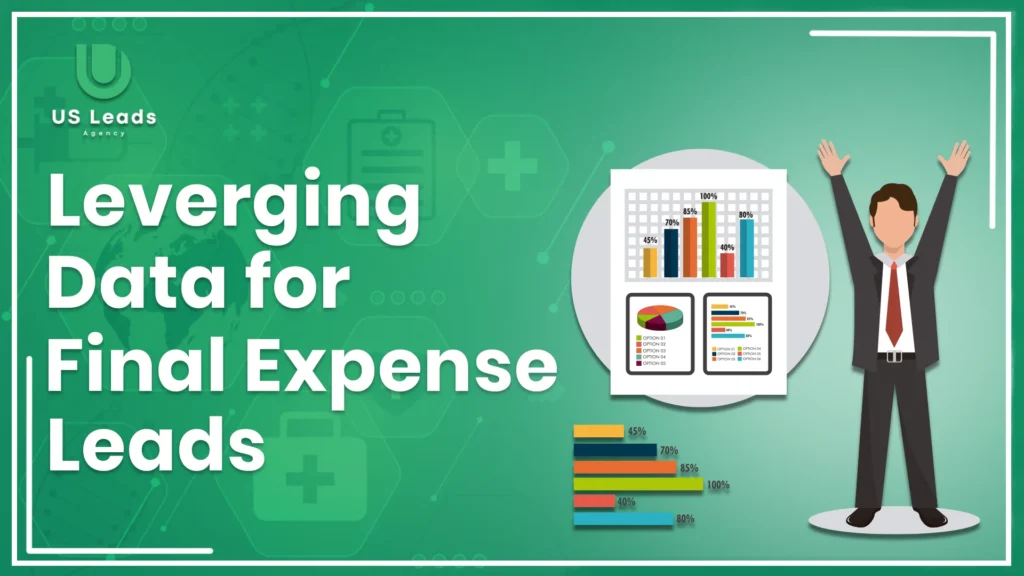
The insurance industry, like many other sectors, has been transformed by the rise of data-driven strategies. Leverage data for final expense leads is one of the most effective ways to boost your success. Data can help you understand your leads better, segment your audience, personalize your marketing efforts, and optimize your entire sales process. By using data intelligently, insurance agents can focus their efforts on the most promising leads and improve their overall conversion rates.
Key Takeaways:
- Leverage data for retention and cross-selling, ensuring long-term customer loyalty and identifying additional sales opportunities.
- Segment your audience based on key data points like health status, income, and age for more targeted outreach.
- Use predictive analytics for lead scoring to focus your efforts on the most promising leads and maximize conversions.
- Personalize your marketing messages by leveraging data to address each lead’s specific concerns and preferences.
- Optimize your sales process with data insights, identifying which strategies and timings work best for each lead.
In this article, we’ll explore the various ways in which you can leverage data for final expense leads to improve the success of your final expense lead campaigns.
By integrating these data-driven approaches, you can enhance your final expense lead success and build stronger, more profitable relationships with your clients.
Table of Contents
Leverage Data For Final Expense Leads Success:
1. Audience Segmentation for targeted campaigns:
One of the most powerful ways to leverage data is through audience segmentation. Not all final expense leads are the same; they come from different backgrounds, have different health statuses, and possess varying financial capabilities. By segmenting your audience based on key data points, you can tailor your messaging to resonate with different groups.
For example:
- Health-based segmentation: Leads with pre-existing conditions may respond better to guaranteed acceptance policies.
- Income-based segmentation: Lower-income leads might be more interested in affordable, low-premium options.
- Age-based segmentation: Younger seniors (e.g., 50-60) may be looking for more comprehensive coverage, while older clients (70+) may prioritize simplicity and affordability.
The more specific your segments are, the more targeted your campaigns can be, improving the chances of conversion.
2. Predictive Analytics for Lead Scoring:
Lead scoring is an essential aspect of data-driven marketing. By using predictive analytics, you can assign a score to each lead based on the likelihood that they will convert. Predictive models analyze historical data and identify patterns that suggest a lead is more or less likely to make a purchase. Factors such as previous interactions, demographic data, and online behavior can all feed into the lead-scoring process.
For example, if a lead has visited your landing page multiple times, opened your emails, and interacted with your social media ads, they might receive a high lead score. This allows your sales team to prioritize outreach to the most engaged leads, reducing wasted effort and focusing on those who are ready to make a decision.
3. Personalizing Marketing Messages with Data:
Data allows you to personalize your marketing messages to suit the specific needs and preferences of your leads. Instead of sending out generic emails or ads, you can craft customized messages that speak directly to the recipient’s concerns.
For instance, a lead who has expressed concerns about funeral costs might receive a message highlighting the affordability of your final expense insurance plans. On the other hand, a lead who has interacted with content about legacy planning may receive a message focusing on the peace of mind that comes with ensuring loved ones are financially protected.
Personalization improves engagement rates, builds trust, and increases the chances that a lead will convert into a policyholder.
4. Optimizing Sales Strategies with Data Insights:
Data doesn’t just help with lead generation and marketing—it can also be used to optimize your sales process. By analyzing your sales data, you can identify which strategies are working and which ones aren’t.
For example, you can track the average time it takes for a lead to move through the sales funnel, identify drop-off points, and adjust your approach to reduce delays or eliminate obstacles. You can also analyze which sales scripts or approaches result in the highest conversion rates and train your sales team accordingly.
In addition, data can help you understand when leads are most responsive. Some leads may prefer morning calls, while others may be more receptive to emails or follow-ups during the evening. Tailoring your outreach based on these insights can significantly boost your success rates.
5. Improving Retention and Cross-Selling with Data:
Once you’ve converted a lead into a policyholder, data can still play a vital role in retention and cross-selling. By analyzing customer data, you can identify opportunities to offer additional products, such as term life insurance or burial insurance.
Data can also help you identify potential red flags for churn. For instance, if a policyholder hasn’t interacted with your communications for an extended period, they may be at risk of switching providers or canceling their policy. Proactively reaching out to these individuals with relevant offers or reminders can help maintain their loyalty.
Retention is crucial in the final expense insurance industry, where long-term relationships and recurring premiums are the foundation of success.
Conclusion – Leverage Data For Final Expense Leads :
Leveraging data is key to achieving success with final expense leads. From segmentation and lead scoring to personalization and sales optimization, data provides invaluable insights that can significantly improve your conversion rates. By implementing data-driven strategies, insurance agents can better understand their leads, refine their messaging, and close more deals.
Moreover, data doesn’t just help with initial conversions—it’s also vital for maintaining long-term relationships with policyholders and identifying opportunities for cross-selling and retention. In a competitive market, agents who use data intelligently will stand out and thrive.
